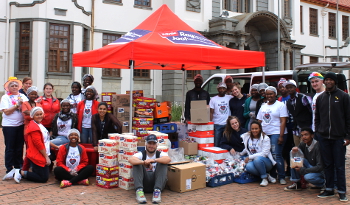Latest News Archive
Please select Category, Year, and then Month to display items
12 October 2020
|
Story Dr Cindé Greyling
|
Photo Supplied
 Exercise and nutrition can work wonders for your mental health – you don’t even have to ‘feel like’ or ‘enjoy’ moving around and eating well for it to work – it does its thing anyway.
Exercise and nutrition can work wonders for your mental health – you don’t even have to ‘feel like’ or ‘enjoy’ moving around and eating well for it to work – it does its thing anyway.
Nowadays, people talk about mental health like it is the common cold – which is good! But do you know what it really means? Being mentally healthy does not only refer to the absence of a mental illness but includes your emotional and social well-being. One would almost want to add physical well-being too, since a healthy body does indeed support a healthy mind. However, since so many people consider themselves ‘mental health experts’, some myths have been sold as truths.
Myth #1 – You are doomed.
Nope. Never. You are never doomed. There is always help. Mental-health therapies range from self-help, talk therapy, medication, to hospitalisation in some cases. Somewhere on this spectrum of treatments, there will be something that works for you. But you must be willing to get the help and do the work. For starters, exercise and nutrition can work wonders – you do not even have to ‘feel like’ or ‘enjoy’ moving around and eating well for it to work – it does its thing anyway.
Myth #2 – It won’t affect you.
It may. Research suggests that one in five people may suffer from a mental illness at some point in their lives. Being well now does not mean that it will stay that way. Biological and environmental factors both impact your mental health. Hopefully not, but at some point, you may experience an event that affects your mental health.
To remain integrated in a community is always beneficial
for anyone suffering from a mental or physical condition.
Myth #3 – Someone struggling with mental health must be left alone.
Hardly! To remain integrated in a community is always beneficial for anyone suffering from a mental or physical condition. You do not need to fix them, but to remain a friend. Continue to invite them, even if they decline. Do not judge, and do not try to understand. Just stay around.
Go and be kind to yourself, and to those around you.
A Kovsie friend in need is a Kovsie friend indeed
2015-09-23

Several student organisations have recently started
initiatives to lessen the burden on needy students,
and on the broader community. It is because of
these initiatives that donations of food, commodities
and clothes reached the No Student Hungry (NSH)
Bursary Programme at the University of the Free State.
Photo: René-Jean van der Berg |
Kovsie students have often showed that a friend in need is a friend indeed. Several student organisations have recently started initiatives to lessen the burden on needy students, and on the broader community.
It is because of these initiatives that donations of food, commodities and clothes reached the No Student Hungry (NSH) Bursary Programme at the University of the Free State.
The Rag Community Service and NSH offices are extremely grateful to students and staff for their selfless donations, also in respect of the difference these initiatives are making to Kovsies’ chances of having a better future.
The food and commodities will be distributed to the community, while the clothing donations are used for regular clothing sales in order to raise funds.
The food donations included a substantial donation from the support organisation, Gift of the Givers. The organisation heard about the NSH Bursary Programme and, due to the scope of the student-hunger problem, decided to become involved.
“This is an excellent initiative, and the passion with which it is driven motivated us to make a donation,” said Ms Emily Thomas, representative from Gift of the Givers.
Ms Karen Scheepers, Assistant-Director: Student Life responsible for Rag Community Service, said the recent donations and initiatives are proof that the Kovsie community really cares for each other.
“I found it amazing how willing students were to help and to give. From the moment we asked for help, students arrived at our offices with loads of stuff.”